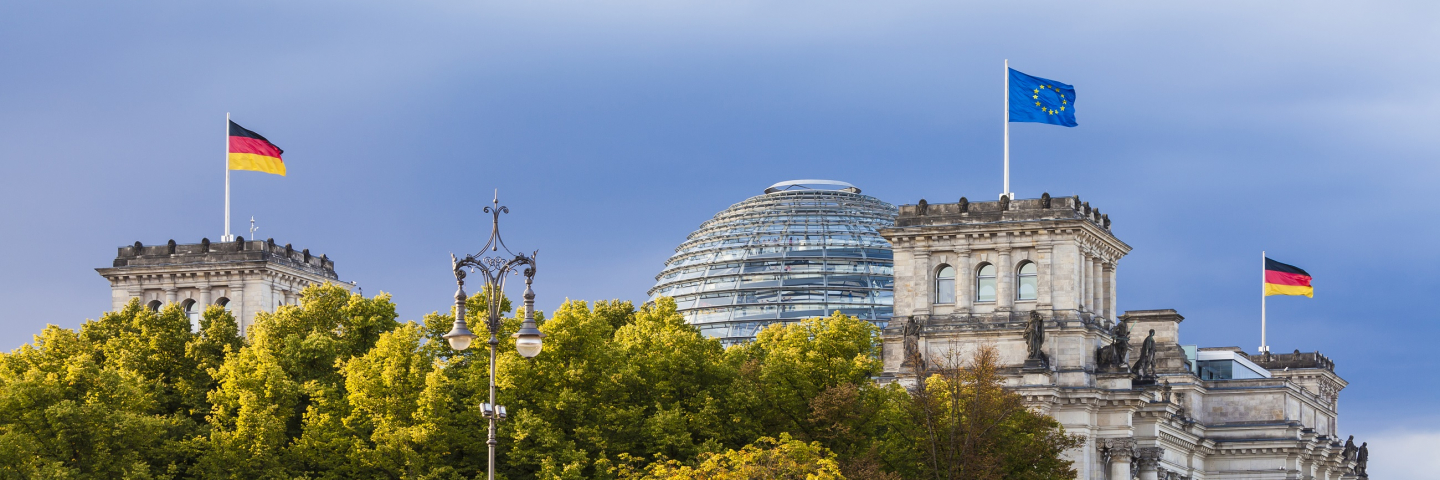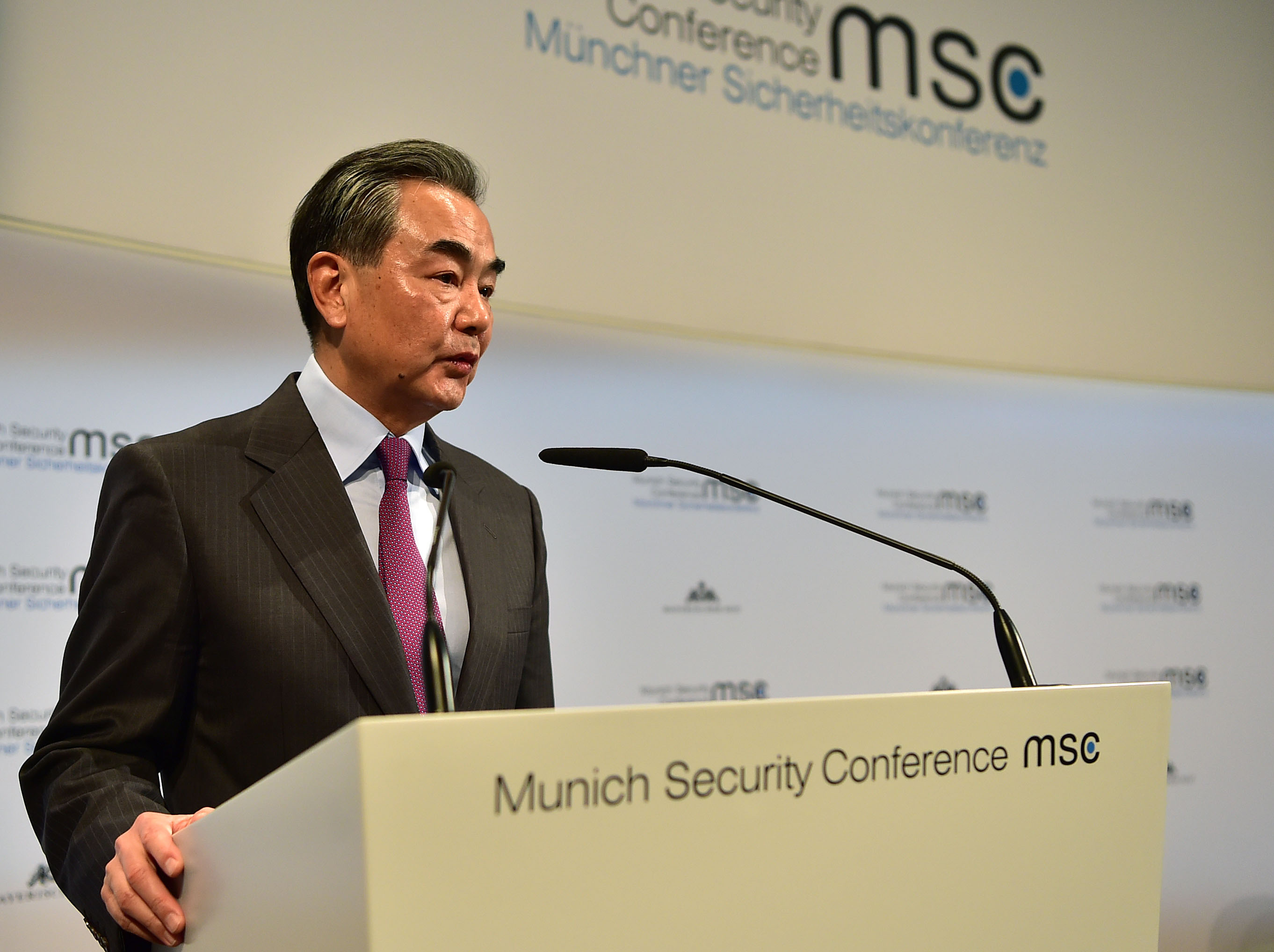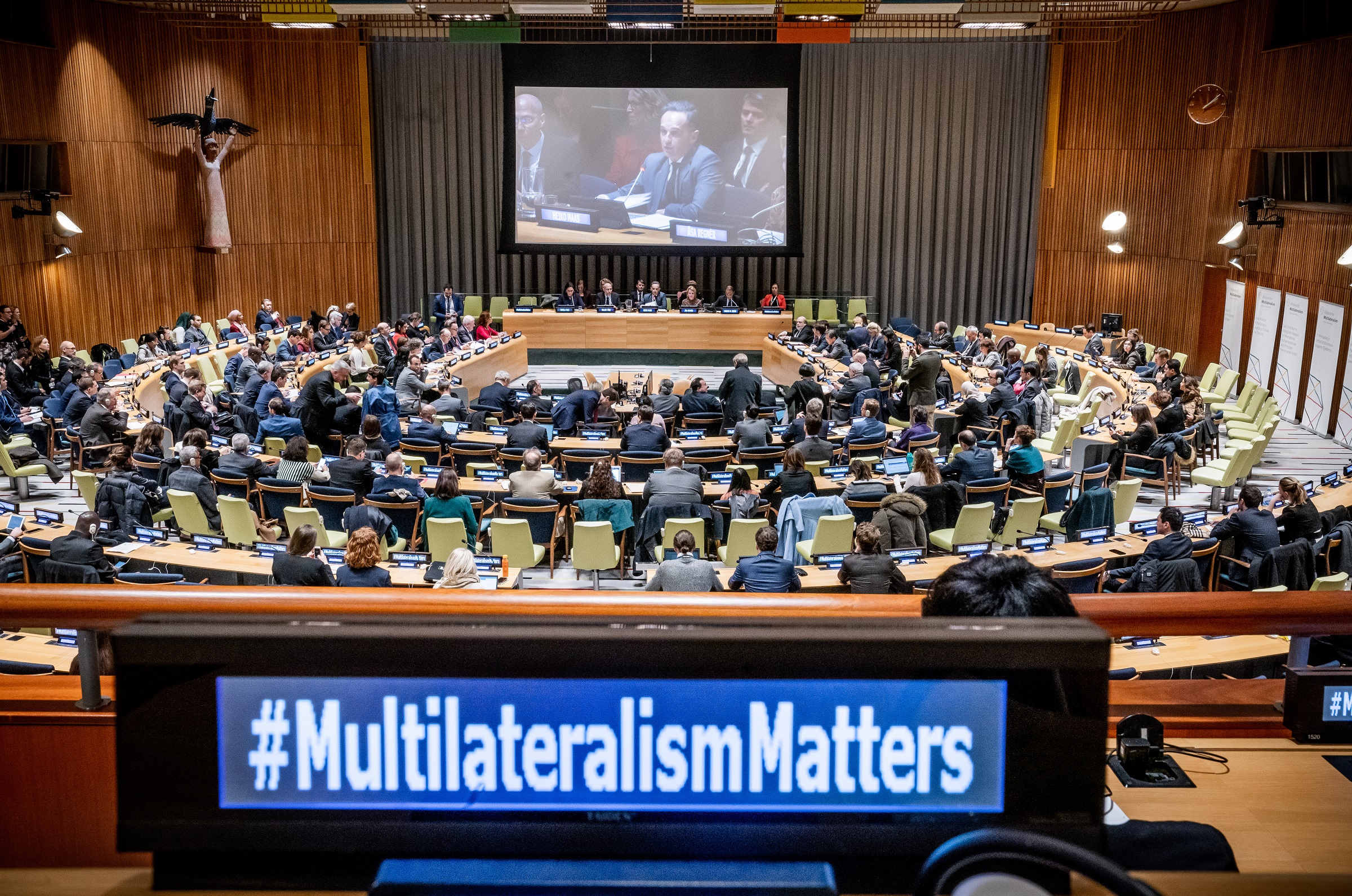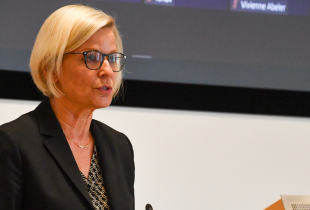
Renewed Transatlantic Responses towards China: Identifying Common Ground
The Western Model of Global Order and the China Challenge?
The western global order originated in the 19th and 20th centuries. It is characterized by formal international institutions and a regime of treaties, rules, norms, networks, expectations, and moral obligations. As Sigmar Gabriel and John B. Emerson note, “Our liberty is protected by democracy, the rule of law, the separation of powers, and freedom of expression and assembly. These shared principles have shaped the outlook on both sides of the Atlantic for decades.”1 These shared democratic, free, and open society principles are challenged by undemocratic non-western, economically and/or militarily successful powers, not least the People’s Republic of China (PRC) and the Russian Federation.
The PRC has a population of 1.4 billion (comprising 18 percent of the global share), a 5,000-year-old history and culture, and boasts the world’s second largest economy. The PRC is ideologically assertive and displays a visible ambition to play a role on the international stage. Sociological theory suggests that the numeric dimension of a group determines social reality. Indeed, as Lenin noted: “quantity has a quality all of its own.” In this light, the PRC is simply “too big and too many” not to shape international politics.
Ironically, the political West is involuntarily assisting in this reconfiguration of international power by voluntarily withdrawing from multilateral institutions and geopolitically-critical regions (the U.S., at least in the Trump administration) or by being overwhelmed with administrative tasks (the European Union, as a result of the growing number of member states, deeper integration, and COVID-19).
From Beijing’s perspective, the current state of global politics—disrupted as it is by the COVID-19 pandemic and complicated by the relative and/or situational weakness of major actors—provides an ideal opportunity for China to increase its international influence. The writing hasMu been on the wall for some time: at the 19th party congress in 2017, Xi Jinping hailed a “new era” of unmatched Chinese power fast approaching. “This is a historic juncture in China’s development. The Chinese nation... has stood up, grown rich, and become strong,” he declared. “It will be an era that sees China move closer to center stage.”
This short paper builds on the analysis offered by a Loisach Group On-Line Transatlantic Dialogue 24-25 September 2020 and will:
- Analyze the drivers of China’s new assertiveness;
- Determine the central challenges to the transatlantic community posed by China’s behavioral shift and its investments into trade, technology and its military build-up;
- Identify where the U.S. and German/European perceptions of China are incompatible, compatible, shared, and convergent; and
- Present ideas and proposals for a renewed transatlantic response towards China.
China’s New Assertiveness
In recent months, Beijing’s foreign policy appears puzzling: why has China displayed such astonishing levels of strategic assertiveness, given it appears self-defeating and constitutes an abandonment of its highly effective “hide and bide” and “peaceful development” strategy? Does China’s shift in strategic behavior represent strength or vulnerability? Andrew Small and Dhruva Jaishankar posit four possible explanations for China’s new assertiveness.2
Opportunistic Assertiveness
The PRC indulges in a temporary short-term push for advantage in a time of global disruption and power transfer in the United States, looking to expand its power and bank its gains. The PRC calculates that reputational damage will be short-lived and reversible. However compelling this explanation, it does not account for China’s strategic behavior towards non- U.S. allies (such as Brazil and especially India).
Imperious Assertiveness
Strategic decision-makers in Beijing are seized by a fit of hubris and over-confidence. A COVID bounce encourages the belief in Beijing that China constitutes a viable alternative to the U.S. as a global power.
Reactive Assertiveness
China’s escalatory strategic behavior is explained by immediate responses to trade restrictions, as well as reputational, security, and political challenges. China seeks to rebut external criticism, deter others, achieve whatever advances are possible, and would plan to dial back its assertiveness in the post-COVID context.
Insecure Assertiveness
China is subject to a combination of internal and external pressures that generate a profound sense of vulnerability, weakness, and political insecurity in Chinese Communist Party circles. As a result, the Communist Party of China (CCP) lashes out in multiple directions in an all-out struggle for survival and uses coercion to deter new potential countervailing coalitions from forming. Thus, ambition, fear, and insecurity drive China's external behavior.
A combination of imperiousness, opportunism, reactiveness, and insecurity resulting in missteps, reputational damage, premature overreach, and systematic overreaction can ultimately be attributed to an overly rigid, self-centered, and less deliberative CCP leadership. In reality, the preponderance of economic, financial, military, diplomatic, and technological resources of states that oppose China’s assertive behavior outweighs the resources China itself can muster. Moreover, China’s current strategic behavior triggers informal and resilient coalition-building to lessen dependence on Chinese investments, reduce its influence, and oppose its coercion.
China’s Multi-Dimensional Challenge to the West
Any list of the challenges China poses to the political West will include the following:
- Breaches of international law in the South China Sea, Sea of Japan, East China Sea, and especially Taiwan;
- Geographical and financial scope of Belt and Road Initiative (BRI) projects, debt-trap diplomacy;
- Instrumental and self-interested approach to multilateralism: China head of four out of fifteen specialized UN bodies and agencies;3
- Securitization of Telecommunication; 5G; Huawei’s global activities; punishment of those that ban Huawei products (e.g. Australia);
- China’s advances in AI, quantum computing, and supercomputer dominance;
- Human Rights Violations (not least, in Tibet, Xinjiang, and Hong Kong);
- Coercive diplomacy, as exemplified by the activities of Chinese “wolf warriors”;
- Undercutting EU unity through its 17+1 format and BRI projects;
- Joint military maneuvers and exercises with Russia; People’s Liberation Army and Navy presence in the Mediterranean, growing defense budget, and arms build-up; and,
- Promoting an alternative “Modernization without Westernization” development model that seeks to replace the foundations of Western modernity—democracy, capitalism, and individualism—with Chinese patriotism, collectivism, and socialism.

MUNICH, Feb. 15, 2020 -- Chinese State Councilor and Foreign Minister Wang Yi makes a speech at the Munich Security Conference in Munich, Germany, on Feb. 15, 2020. Wang Yi on Saturday called for crossing East-West difference and practicing multilateralism at the Munich Security Conference.
Growing German-U.S. Strategic Convergence
Since March 2019, the European Union has adopted a “partner, competitor, and systemic rival” formula towards China. The PRC is an important economic partner at the state/regional levels in Europe. But this “benign partner” narrative was subject to stress- and reality testing through 2020. As a result, the meanings of the “competitor” and “systemic rival” roles came more into focus, making alignment between Germany/Europe and the U.S. more likely, even though Europe does not have an agreed common threat assessment regarding the PRC.
Although the U.S. is highly polarized, politicized, and divided, there is a bipartisan agreement acknowledging the PRC threat. There are, however, different perspectives within and between parties over how to address the challenge, reflecting a lack of consensus over specifics. Bipartisan bills in the House address human rights, forced labor, and repression in Hong Kong and Tibet. In the Senate, Democrats have prepared a comprehensive strategic blueprint towards China in a new administration across a number of jurisdictions, reflecting the PRC’s comprehensive presence. However, there is a growing transatlantic convergence of views, with greatest convergence about human rights abuses, and least on economics, trade, investment, debt, and intellectual-property rights. A recent study by Hans Binnendijk, Sarah Kirchberger, and Christopher Skaluba4 noted the following:
Areas of High Convergence
- Autocratic practices and human rights violations;
- Coercive diplomacy and influence operations;
- Technology theft and cyber competition;
- Predatory trade and investment practices; and
- Aggressive behavior in the military and security areas.
Areas of More Limited Convergence
Economics, trade, investment, debt, and intellectual property rights: “. . . the abandonment of the Transatlantic Trade and Investment Partnership (TTIP) and the Trans-Pacific Partnership (TPP) Agreements by the U.S. administration have undercut the basis for coordinated approaches.”5
Areas of Convergence and Divergence
Security and defense
- Shared threat perception of Russian-Chinese military exercises in the European region;
- Common recognition of security implications associated with Chinese investments in critical infrastructure;
- Incompatible transatlantic threat assessments regarding the threat posed by Chinese conventional military, with Europeans more focused on Russian rather than Chinese cyber and hybrid activities;
- Asymmetric perceptions: for the United States, China is a direct threat, Russia an indirect threat; for Germany and EU, China is an indirect threat, Russia a direct threat.
A Common Transatlantic Response
In order to create a common transatlantic approach towards China, a stakeholder mapping exercise is necessary. This involves conducting a strategic assessment of the impact of Chinese policies on democracies, to create a shared perception of the challenge, and develop common ground, common language, compatible attitudes, and institutional approaches. It means forging consensus on what the transatlantic partners need to do to enable desired defense, deterrence, and wealth creation by 2030 and then develop an operational plan to achieve these goals. Such mapping could identify, inter alia:
Technological and biological sciences partnership
Germany and the U.S. need to develop common answers to the common challenge posed by new technologies (e.g. nano, bio, AI, robotics), all of which can be used for defense (in particular, in the sense of offense). Resilience also can be achieved much better within the context of NATO. COVID-19 will not be the last pandemic we face and prevention is better than cure: “the Euro-Atlantic alliance keeps you healthy” is a clearly understood narrative that can connect with societies.
Center of Excellence (CoE) focused on supply chain security
This CoE recognizes that PRC investments in critical European infrastructure (e.g. ports) could make a difference in a crisis. This center could be located in Japan or the Republic of Korea. It should work to ensure that all critical goods and services are sourced from supply chains that stay within the alliance or alliance partners, with a commitment to harmonize the alliance’s domestic legislation to redefine and expand national security exemptions for the World Trade Organization (WTO) and to expand into a “Buy NATO” provision for essential goods and services, as well as the tax incentives and grants for necessary infrastructure construction. Politically, this proposal should be pitched as a “Euro-Atlantic alliance jobs-generating program.”
New “Burden Sharing Bargain”
The German government recently published its first “Policy Guideline for the Indo-Pacific,”6 which suggest that Germany could exercise economic leverage in its relations with the PRC, given Europe lies at the end of BRI, and the eighty dialogue frameworks with China can be made to work or be suspended. As the U.S. moves to a 355-vessel navy, Germany can compensate for the U.S. defense reductions elsewhere by increasing its first responder and crisis manager burden-sharing roles in its neighborhood.7 In this way, the utility of European NATO is enhanced. Article 3’s self-help/resilience focus can be emphasized further by continuing to develop and enhance the porcupine defense capabilities of the alliance: the slogan “Partners helping to support themselves” defangs the “freeloaders” argument.
German Defense Spending
The Federal Ministry of Defense is confident that it is a reliable defense partner with regards to defense spending as:
- The German Defense Budget is going up (2020: €44 billion; 2021: €45.6 billion; each following year plus €1.6 billion; 2024: €50.4 billion) and
- Germany has managed the COVID-19 crisis in a way that does not preclude further defense budget increases (in contrast to the EU military spending, which will decrease in light of the “Green Deal.”)8
Defense budgets reflect political priorities and threat assessments. The political reality is that Europeans are continuously violating (at least the spirit of) Article 3. Germany needs to meet the 2% GDP defense spending benchmark for strengthening the alliance, as if NATO becomes hollowed out, 4-6% GDP spending will be necessary to achieve “strategic autonomy” outside the alliance. Forces and capabilities targets are as important defense spending. Germany must be politically and militarily stronger, sooner, and more globally aware.
Institutional Adaption
To meet the Chinese challenge, new multilateralism should be more inclusive, networked, flexible, and agile. To that end, a NATO-Indo-Pacific Council that includes some D10 states in the region allows for multilateral dialogue with the PRC around security issues broadly defined, with a NATO-China Council embedded within it. A U.S.-EU commission on China would complement this effort.
“Three Seas” Initiative
The U.S. and Germany should examine their common support for the Three Seas Initiative, designed to boost economic prosperity through connectivity between the Baltic, Adriatic, and Black Seas. Could this initiative also serve as a counterweight to Chinese BRI interests and influence in Eastern Europe? Within this strategic intent, the U.S. could ease its pressure on North Stream 2 and contribute more constructively to pan-European energy security designs.
“Gen Z” Narrative
“Gen Z” are not “born Atlanticists,” cognizant of the need for NATO’s commonality of purpose and interests, and are not exposed to a positive narrative around the need for a reinvigorated transatlantic relationship. NATO needs to restate and highlight the importance of core democratic values, individual human rights, freedom of information, rule of law, and privacy rights to help “Gen Z” understand the significance of the threat. Allies share the common goal of preserving the integrity of their own democratic processes and public information spheres.

27 February 2020, US, New York: Heiko Maas (SPD), Foreign Minister, will speak at the beginning of the meeting of the Alliance for Multilateralism under the slogan “#MultilalteralismMatters” at UN headquarters. This initiative, founded by Germany and France, deals with international cooperation at all levels in times of nationalism and isolation. During the two-day visit of Meuse to the United Nations, meetings on the situation in Syria, Libya and the Nuclear Non-Proliferation Treaty were also on the agenda.
Conclusion
Once certified by the Electoral College, President-elect Joe Biden will become 46th President on 20 January 2021, providing the U.S. with an opportunity to reposition America in the world, reconstitute the liberal international order, and reassert U.S. global leadership. Transatlantic disruptions have led to a nearly unprecedented low in U.S.-German relations since 2016, as the Trump administration appeared to question the transatlantic security relationship as a central pillar of U.S. global engagement. The leadership style, personality, and pronouncements of President Trump are transient in nature and can be overcome. The Biden administration can reset transatlantic relations by disavowing unconstrained unilateralism, ditching pay-as-you-go relationships, and combining power and legitimacy differently than the Trump administration, and reassuring allies in NATO as well as Japan and ROK in the Asia-Pacific.
President-elect Biden is an avowed Atlanticist. President Biden and his administration’s policy will be more aligned, predictable, regularized and reliable. U.S. policy will be less obviously short-term and transactional, with notions of diffuse reciprocity and multilateralism back in vogue. If personnel is policy, and the next Secretary of Defense is Michèle Flournoy, then it is likely China will be viewed as the top competitor of the U.S. and also the largest long-term security threat, marking continuity with Trump foreign policy and traditional U.S. defense orthodoxy. The Biden administration will find a willing partner in Germany.
In congratulating the president-elect, Chancellor Merkel signaled that Germany is committed to reducing the U.S. burden of global security by taking on a greater share. In terms of economic competition with China, for example, the U.S. may rejoin the “Trans Pacific Partnership” and, together with Germany,
take the lead in reviving the Transatlantic Trade and Investment Partnership, pursuing new fair and free-trade agreements—not least in Africa—and offering a transatlantic infrastructure initiative to serve as a transparent, democratic alternative to China’s Belt and Road Initiative.9
However, the Biden administration faces a paradox: COVID-19, climate change, technological disruption, and China’s confrontation with the political West demonstrate that challenges that no one state can address constitute a shared interest and cooperative imperative, but—despite transnational interdependence—domestic barriers to global cooperation can lead to paralysis. Internal and external structural realities help explain the paradox.
James Madison built into the U.S. constitutional design the dispersal of power between the executive, judiciary, and legislature, itself divided into two bodies. In this way, the necessity of alliance-building and compromise was central to the republic. Longer-term external structural factors, such as demographics, access to food and energy resources, and the integrity of international institutions may affect Germany and the U.S. differently, leading to divergences if not carefully managed.
Can a Biden administration forge consensus in a country with a divided, polarized electorate and without control of the Senate? An alliance that is economically prosperous and politically united is capable of deterring an assertive and expanding China. What is essential for a “renewed transatlantic response towards China” is a clear commitment on both sides of the Atlantic to renew and strengthen the partnership and uphold a rules-based international order. Political, economic, and cultural dialogue formats can be revived and policy alignments in the context of structural differences are possible. It may well be that the new administration can leverage the China challenge to build support for an industrial policy, infrastructure building, and AI investments, which will have implications for transatlantic cooperation.
For Academic Citation
Kathrin Bastian and Graeme P. Herd, “Renewed Transatlantic Responses towards China: Identifying Common Ground,” Marshall Center Perspectives, no. 18, November 2020, https://www.marshallcenter.org/en/publications/perspectives/renewed-transatlantic-responses-towards-china-identifying-common-ground-0.
Notes
1 Sigmar Gabriel and John B. Emerson, “Transatlantic Reunification Agenda,” Project Syndicate, November 9, 2020, https://www.project-syndicate.org/commentary/us-germany-transatlantic-reunification-agenda-by-sigmar-gabriel-and-john-b-emerson-2020-11.
2 Andrew Small and Dhruva Jaishankar, “‘For Our Enemies, We Have Shotguns’: Explaining China’s New Assertiveness,” War on the Rocks, July 20, 2020, https://warontherocks.com/2020/07/for-our-enemies-we-have-shotguns-explaining-chinas-new-assertiveness/.
3 International Civil Aviation Organization; International Telecommunications Union; Food and Agriculture Organization; and U.N. Industrial Development Organization. China also tried to become head of the World Intellectual Property Organization in May 2020, but Daren Tang (Singapore) was elected.
4 Hans Binnendijk, Sarah Kirchberger, and Christopher Skaluba, “Capitalizing on transatlantic concerns about China In-Depth Research & Reports,” The Atlantic Council, August 24, 2020, https://www.atlanticcouncil.org/in-depth-research-reports/issue-brief/capitalizing-on-transatlantic-concerns-about-china.
5 Ibid.
6 German Federal Government. “Policy Guidelines for the Indo Pacific,” August 2020, https://www.auswaertiges-amt.de/blob/2380514/f9784f7e3b3fa1bd7c5446d274a4169e/200901-indo-pazifik-leitlinien--1--data.pdf.
7 Daniel S. Hamilton, “Transatlantic Relations after the U.S. Elections: Unhinged or Reinvented?” Internationale Politik Quarterly, Fall 2020, “Remake or Break,” https://ip-quarterly.com/en/unhinged-or-reinvented.
8 As a result of COVID-19 and the shrinking GDP, the share of German military spending in 2020 has already risen from 1.36 to 1.57 per cent and the 2020 budget already encompasses 51.5 billion Euro. NATO announced these numbers October 21, 2020.
9 Gabriel and Emerson, “Transatlantic Reunification Agenda.
About the Authors
Katrin Bastian is a Lecturer of Security Studies at the George C. Marshall European Center for Security Studies. Before joining the GCMC in autumn 2020, Dr. Bastian worked as the personal adviser to the Ambassador of the Principality of Liechtenstein in Berlin. During her sixteen years of service at the embassy, she also worked as lecturer of international relations and EU foreign policy at Humboldt University Berlin (2005-2008) and at the University of California at Berkeley (2009).
Graeme P. Herd is a professor of transnational security and chair of the Research and Policy Analysis Department at the George C. Marshall European Center for Security Studies. He directs a Russian Strategy Initiative-funded and GCMC-led research project that examines Russia’s strategic behavior.
The George C. Marshall European Center for Security Studies
The George C. Marshall European Center for Security Studies in Garmisch-Partenkirchen, Germany, a German-American partnership, is committed to creating and enhancing worldwide networks to address global and regional security challenges. The Marshall Center offers fifteen resident programs designed to promote peaceful, whole of government approaches to address today’s most pressing security challenges. Since its creation in 1992, the Marshall Center’s alumni network has grown to include over 14,000 professionals from 157 countries. More information on the Marshall Center can be found online at www.marshallcenter.org.
The articles in the Perspectives series reflect the views of the authors and are not necessarily the official policy of the United States, Germany, or any other governments.

